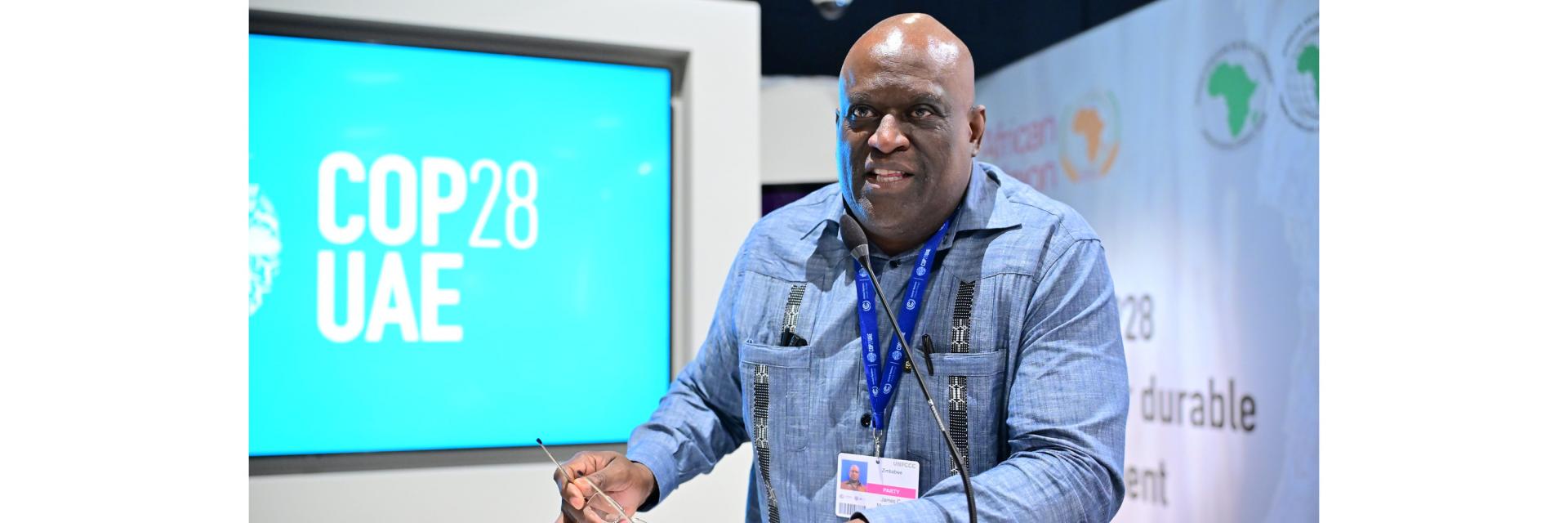Dubai, United Arab Emirates, 10 December 2023 (ECA) – Climate change negotiators in Africa have called on COP28 to deliver a fair and balanced Global Stocktake that catalyses greater ambition across all elements of climate action in Africa, centred on equity for a Just Transition.
“The just transition and resilient low‐carbon development, if not properly designed, risks widening the developmental gap between Africa and the rest of the world,” said Collins Nzovu, Zambia’s Minister of Green Economy and Environment and Chair of African Group of Negotiators on Climate Change (AGN) in a statement read on his behalf by James Murombedzi, chief of Climate Change Section at the Technology, Climate Change & Natural Resource Management Division at the ECA.
The AGN’s statement was read at a briefing session on the Status of COP28 climate change negotiations at COP28 in Dubai organized by ECA and AGN.
The COP28 work programme is aimed at promoting sustainable development; and climate finance under the climate convention as well as the Paris Agreement. As such, Mr Nzovu said AGN expects COP28 to result in tangible outcomes which reflect Africa’s aspirations, especially on the need for enhanced climate adaptation.
He noted that even though COP28 has come to an end and decisions have to be made, concerns have been observed about the lack of progress on various issues of importance to the group, particularly on finance and adaptation.
“We should design a robust and comprehensive work programme including elements, scope, and modalities here in Dubai, that recognizes the different pathways for achieving the goals of the Paris Agreement,” he said.
For his part, Mwenda Mithika, Executive Director Pan African Climate Justice Alliance (PACJA) said as COP28 concludes, African countries need to reflect and ensure that key issues that include adaptation and finance are addressed “to captures the spirit of Africa.”
“If these crucial issues are not captured in the final declaration then we shall declare COP28 a failure,” said Mr Mithika.
“The issue of adaptation and adapation finance is critical for us. We have only US $39 million pledges, loss and damage pledges need to be honored. The green climate fund still remain a shell. These need to be clearly addressed.”
On just transition he said Africa needs its own narrative that includes survival and not just agriculture. Transition to low carbon transition is inevitable.
Jean Su, Energy Director – Climate Law Institute, Center for Biological Diversity said global north countries like the United States, Canada, Norway, Australia, who are key fossil fuel producers have to take the moral stance right now, to stand firm for the people and the planet, to stop their own fossil fuel production, which they are disproportionately responsible for.
“These countries have to step‐up with finance because they have disproportionately polluted the planet, and this is their moral responsibility,” said Su.
AGN indicates that COP28 has been a crucial moment for global climate action to take stock of the implementation of the Paris Agreement of 2015 on adaptation, loss and damage, mitigation and means of implementation and these areas of concern need to be considered as below:
Adaptation is a matter of survival for Africa and key areas that need to be addressed include coping with persistent droughts, devastating storms and rising seas which threaten lives and livelihoods.
Mr Nzovu emphasized the UN Secretary-General, António Guterres’ call: “Lives and livelihoods are being lost and destroyed, with the vulnerable suffering the most. We are in an adaptation emergency. We must act like it. And take steps to close the adaptation gap, now.”
He noted that COP28 is mandated to complete the work undertaken for the past two years under the Global Goal on Adaptation (GGA), which is a collective commitment under Article 7.1 of the Paris Agreement aimed at “enhancing adaptive capacity, strengthening resilience and reducing vulnerability to climate change.
On Loss and Damage he said a historic and positive move of creating the Loss and Damage Fund was operationalised and initial financial commitments made.
“We hope the pledges will be honoured. The loss and damage requires billions, if not trillions, of dollars. We, therefore, call for more resources in order to actualise the intended purpose of the Fund, addressing loss and damage,” he said.
He said that Finance is critical for the implementation of both the convention and the Paris Agreement but there is a decline in the delivery of public climate finance in real terms.
“Developed countries have not met the US$ 100 billion per year mobilization goal by 2020. The goal of doubling adaptation finance from 2019 levels by 2025 is an undertaking on paper only,” he said.
On the Global Stocktake (GST) he said we have now reached the final leg of the consideration of the output phase. It’s important that the outcome is practical and one that all parties can effectively implement.
“GST must explicitly recognise Africa's developmental constraints and challenges and facilitate the provision of the support and development space for the continent to exploit its natural resources and endowments for achieving Sustainable development goals,” he said.
“The GST outcome must enable us to achieve the purpose of the Paris Agreement in the fullest sense.”
On the just transition pathways, he said the African Group welcomes the establishment of this important Work Programme. Advancing the implementation and strengthening of the global response to the threat of climate change, however, this should be in the context of equity and centre on sustainable development and poverty eradication.
Among the achievements at COP28 include the promising long China‐US bilateral, Bezos Earth Fund pledge of US $100m to protect 1 billion hectares in the Pacific, US $ 7 Trillion Annual finance flows towards climate, biodiversity, and land degradation crises.
Issued by:
Communications Section
Economic Commission for Africa
PO Box 3001
Addis Ababa
Ethiopia
Tel: +251 11 551 5826
E-mail: eca-info@un.org

